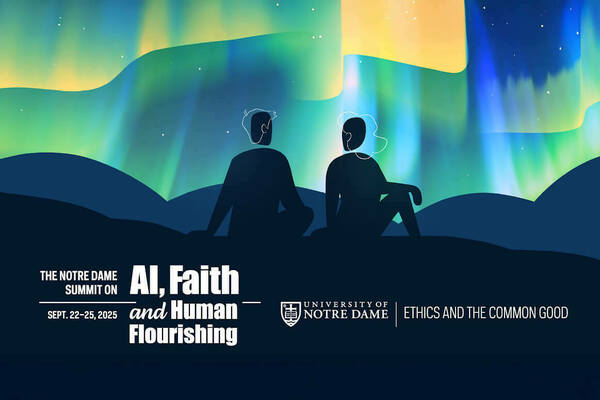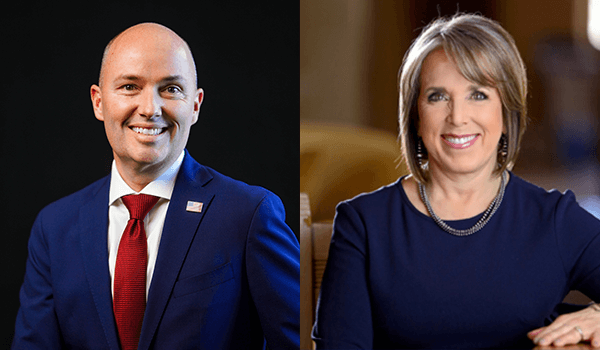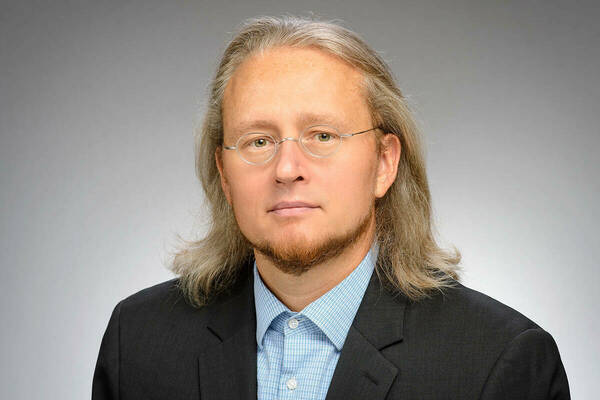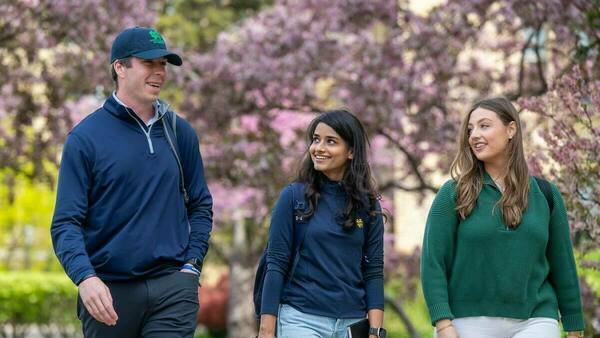Danielle Allen discusses the current state of democracy, encourages focus on state government
Speaking as part of the 2024-25 Notre Dame Forum, Danielle Allen, the James Bryant Conant University Professor and director of the Allen Lab for Democracy at Harvard University, explored technology’s impact on democracy, the importance of bridging ideological divides, and the role state government plays in shaping national politics in a lecture titled Bringing Democracy Back from the Brink: A Strategic Vision and Call to Action.”
In his opening remarks, University President Rev. Robert A. Dowd, C.S.C., noted that for the first time in more than 20 years, the world has fewer democracies than autocracies, citing the most recent Varieties of Democracy (V-Dem) report.
“Strengthening democracy will require each of us to work together and build bridges, most especially with those with whom we may disagree,” he said. “Danielle is and has been a critical voice in helping us to think about how we can navigate the way forward together.”
The theme of this year’s Notre Dame Forum is “What do we owe each other?”
A professor of political philosophy, ethics, and public policy, Allen is a renowned author and advocate. In 2020, she was awarded the Library of Congress’s Kluge Prize for “her internationally recognized scholarship in political theory and her commitment to improving democratic practice and civics education.”
“Universities are such important institutions for civil society in making space for a huge range of opinion, for debate in the job of seeking understanding, which we do together,” Allen said. “So, what’s one of the things we owe each other? It is to talk honestly and completely about what we see in the world around us. It is that frank conversation, a complete conversation, and one that is also about our core respect for the sacred human dignity of everybody else that we’re in conversation with.”
Allen described her journey to the work of “democracy renovation,” an approach she described as rooted in civic education, grounded in knowledge, and aimed at renovating institutions to be responsive and work effectively for the people.
“We are living through a time in which our society is under incredible pressure because of broad, socioeconomic changes,” Allen said, comparing current issues around inequality of income and wealth and disparities of power to those experienced during the Gilded Age of the late 19th century. “Those changes, the pressures we’re under, are also technological.”
Technology, particularly the rapid development of artificial intelligence, she said, is straining the fundamental tenets of democracy, changing the economy, driving significant unprecedented levels of migration, and disrupting the distribution of power.
How can citizens respond to that disruption?
“Our federal edifice is made out of units of states, and at the end of the day, the quality and health of our state government is, I believe, the single most important factor determining the quality and health of our national government,” Allen said.
She encouraged attendees to consider whether their state government models a healthy democracy.
“Do we have responsive representation at the state level? Do we have engaged citizens who have a good civic education, who are prepared to take responsibility, to work on problem-solving with others across lines of difference?”
Allen shared observations about the current administration and offered a list of executive branch actions citizens should watch for that signal an appropriate balance of power. Those include: the executive branch’s willingness to respect Supreme Court decisions, especially when they counteract actions taken by the executive branch; the degree to which the executive branch protects citizens’ sensitive data; and a demonstrated commitment to strengthening Congress.
Following her presentation, Allen fielded questions from the audience, moderated by Mary Gallagher, the Marilyn Keough Dean of the Keough School of Global Affairs.
Asked how students could help transform the current political landscape for the better, Allen again encouraged a deeper understanding and involvement in state and local government.
She also discussed how operating with integrity and moral character across the political spectrum starts with each individual.
“From my point of view, it makes it all the more imperative that we restore the importance of character, that each of us in our own lives, private and public, every chance we have, speak up for integrity and kindness and compassion and the refusal to treat people in a bullying fashion,” Allen said.
Allen’s talk also served as the 31st annual Hesburgh Lecture in Ethics and Public Policy, co-sponsored by the Kroc Institute for International Peace Studies, part of the Keough School of Global Affairs. Asher Kaufman, John M. Regan, Jr. Director of the Kroc Institute, introduced the lecture series, which honors Rev. Theodore M. Hesburgh, C.S.C., Notre Dame’s 15th president and the Institute’s founder. Allen joined a long list of thinkers, authors, and activists who have delivered the annual Hesburgh Lecture.
Watch a recording of the event here. To see future events related to the 2024-25 Notre Dame Forum, visit forum2024.nd.edu.
Latest ND NewsWire
- Banks that identify fraudsters increase loyalty, retain more defrauded customers than others who never were compromisedIn a new research study, Vamsi Kanuri, the Viola D. Hank Associate Professor of Marketing at the University of Notre Dame’s Mendoza College of Business, found that banks that identify fraudsters earn customer loyalty and lose customers if they can’t say who was responsible for a fraudulent transaction.
- Notre Dame to host summit on AI, faith and human flourishing, introducing new DELTA frameworkThe Institute for Ethics and the Common Good and the Notre Dame Ethics Initiative will host the Notre Dame Summit on AI, Faith and Human Flourishing on the University’s campus from Monday, Sept. 22 through Thursday, Sept. 25. This event will draw together a dynamic, ecumenical group of educators, faith leaders, technologists, journalists, policymakers and young people who believe in the enduring relevance of Christian ethical thought in a world of powerful AI.
- Notre Dame Democracy Initiative hosts bipartisan conversation with Western state governorsTwo Western state governors known to work across the aisle on policy issues such as water, housing and energy will visit the University of Notre Dame for a fireside chat about how Western state pragmatism can serve as a model for the country to overcome polarization.
- In new research, Roy Scranton explores climate change and the limits of human progressIn his most recent book, “Impasse: Climate Change and the Limits of Progress,” Scranton, an associate professor of English, defines the impasse he sees as “not only political and institutional, but cognitive, existential and narrative” and asserts that the only path forward is through embracing what he terms ethical pessimism. “A lot of people confuse pessimism with nihilism, apathy and despair,” Scranton said. “But pessimism is actually about recognizing our limits, letting go of unrealistic goals, finding solidarity in the fact of human suffering and doing what you can now, not in some utopian future.
- Notre Dame MBA launches deferred admission programThe Notre Dame MBA Deferred Admission Program allows candidates with little or no work experience, including college seniors, to secure admission before reaching the recommended three years of work experience to enroll.
- ‘Prebunking’ false election claims may boost trust in electionsIn recent years, democracies worldwide have seen a growing erosion of trust in election outcomes and institutions, driven in part by fears of widespread fraud. New Notre Dame research finds that “prebunking” — providing accurate information before false claims spread — boosts trust in elections more effectively than traditional fact-checking.













